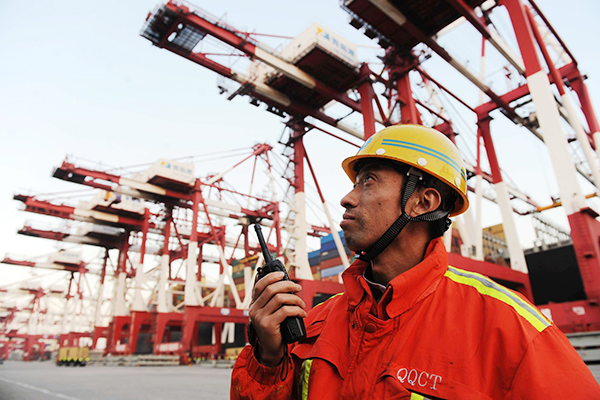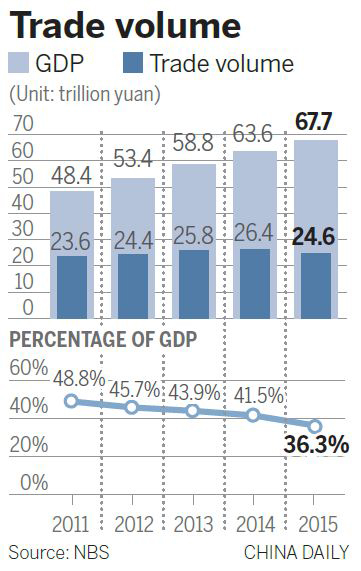China called invulnerable to trade war
A worker looks closely as containers are unloaded in Qingdao Port, Shandong province. [Photo/China Daily]
Country has prepared in recent years amid economic reform and building of stability, officials say

Anybody fancying a trade war with China might have missed their best opportunity, according to trade officials and economic advisers, who said the Chinese economy has already passed the stage of being vulnerable to such actions.
They said trade is no longer a main factor contributing to the nation's GDP growth, and the country has made preparations in the past few years for taking on the challenge of a possible rise in protectionism.
They also said that trade was not among the key tasks assigned by the just-completed Central Economic Work Conference, a yearly top-level decision-making meeting to map out the development strategy for the coming year.
In the conference's communique, only the quality of import and export goods was briefly mentioned.
More than ever, China is relying on its own reform and stability for building its economic strength, they said.
Nonetheless, Li Guanghui, vice-president of the Chinese Academy of International Trade and Economic Cooperation affiliated with the Ministry of Commerce, said that this year, "protectionism will continue to rise and trade frictions will become more violent".
One of the worst trade frictions, he said, could occur between China and the United States, since president-elect Donald Trump has said he will impose punitive tariffs on imports from China.
Zhang Yansheng, chief economist of the China Center for International Economic Exchanges, a think tank close to the government, said that the expected rise in the US inflation level this year would weaken US exports and stimulate imports, resulting in a growing trade deficit and an eagerness by Washington to make China a scapegoat.
Should that happen, "China must handle it well", Zhang said, adding that China has no shortage of available countermeasures.
China's confidence in facing protectionism by the US lies in the reform it recently has made. Its growth is no longer export-driven but led primarily by domestic consumption, which accounted for 66.4 percent of its GDP growth in 2015, according to Ministry of Commerce data.
"China has reduced its reliance on exports for growth to a great extent, thanks to its prompt shift to domestic demand when global market demand was no longer in high growth in the last few years," said Zhang.
At the same time, the country is improving industrial quality and sharpening its competitive edge in the global market, he noted.
Yu Jianlong, secretary-general of the China Chamber of International Commerce, said Trump is unlikely to have a major impact on China-US trade, much less on China's overall strength.
The US has taken repeated protectionist measures against China in the past 15 years, he said, but bilateral trade has "by and large" fared well-thanks to the long value chain of Chinese industry and the capability of the world's second-largest economy to provide for the various needs of the US market.
Even the US' failure to recognize China's market-economy status will not be able to derail China-US trade, Yu said.
Trade volume between the world's two largest economies has increased rapidly, growing from about $70 billion 20 years ago to nearly $600 billion in 2015.
According to the World Trade Organization, China's merchandise exports amounted to almost $2.3 trillion in 2015, despite a 3 percent dip from the previous year.
If Trump, who takes office on Jan 20, imposes a 45 percent tariff on Chinese goods and reduces China's exports to the US by half, it is unlikely to affect the nation's highly diversified global trade income picture, a HSBC report said in November.
More than 60 percent of China's exports are currently directed to markets other than the US, Japan and the eurozone, the report said.


















